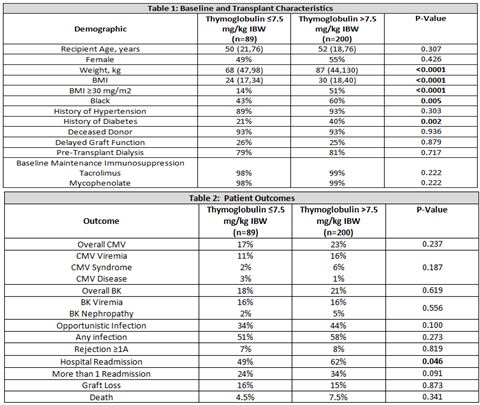Safety, Efficacy, and Cost Saving Potential of Various Weight-Based Dosing for Thymoglobulin Induction Therapy in Kidney Transplant Recipients.
1Department of Pharmacy, Medical University of South Carolina, Charleston, SC
2Department of Surgery, Medical University of South Carolina, Charleston, SC.
Meeting: 2016 American Transplant Congress
Abstract number: C47
Keywords: Efficacy, Induction therapy, Safety
Session Information
Session Name: Poster Session C: Clinical Science - Kidney Immunosuppression: Induction Therapy
Session Type: Poster Session
Date: Monday, June 13, 2016
Session Time: 6:00pm-7:00pm
 Presentation Time: 6:00pm-7:00pm
Presentation Time: 6:00pm-7:00pm
Location: Halls C&D
Introduction: There are limited data assessing the appropriate weight to use when dosing Thymoglobulin for induction therapy. The aim of this study is to assess safety and efficacy utilizing different weights to identify the optimal weight calculation for Thymoglobulin dosing.
Methods: This was a retrospective longitudinal cohort study of adult kidney transplant recipients between January 2010 and December 2014. All patients who received at least one dose of Thymoglobulin for induction immunosuppression were included in the study. Recipients of multi-organ transplants were excluded. Patients were assessed based on cumulative Thymoglobulin doses of >7.5 mg/kg or ≤7.5 mg/kg, comparing the association of total (TBW), ideal (IBW), and adjusted body weights (AdjBW) for efficacy and safety outcomes.
Results: A total of 289 patients were included. Baseline characteristics were similar between groups, with differences observed in weight, BMI, race, and history of diabetes. There was no association between acute rejection utilizing TBW, IBW, or AdjBW at any Thymoglobulin dose between 6 and 10 mg/kg (p>0.7). IBW was the only weight associated with safety outcomes with a statistically significant association in hospital readmissions in patients receiving ≤7.5 mg/kg IBW (p=0.046). Using multivariate analysis adjusting for covariates, the cumulative Thymoglobulin dose based on IBW was an independent risk factor for infection (p=0.018). All other safety outcomes were similar between weight groups (P>0.1). If IBW is utilized to calculate Thymoglobulin dosing, there is a potential cost savings of approximately $220,000 for every 50 patients.
Conclusions: IBW was the only weight-based dosing strategy significantly associated with safety outcomes. None of the other weight-based dosing strategies were associated with risk of acute rejection. IBW dosing may have the added advantage of cost savings. Prospective studies are needed to confirm these findings.
CITATION INFORMATION: Miller R, Meadows H, Strout S, Veasey T, Mardis A, Fleming J, Mardis C, Pilch N, Chavin K, Taber D. Safety, Efficacy, and Cost Saving Potential of Various Weight-Based Dosing for Thymoglobulin Induction Therapy in Kidney Transplant Recipients. Am J Transplant. 2016;16 (suppl 3).
To cite this abstract in AMA style:
Miller R, Meadows H, Strout S, Veasey T, Mardis A, Fleming J, Mardis C, Pilch N, Chavin K, Taber D. Safety, Efficacy, and Cost Saving Potential of Various Weight-Based Dosing for Thymoglobulin Induction Therapy in Kidney Transplant Recipients. [abstract]. Am J Transplant. 2016; 16 (suppl 3). https://atcmeetingabstracts.com/abstract/safety-efficacy-and-cost-saving-potential-of-various-weight-based-dosing-for-thymoglobulin-induction-therapy-in-kidney-transplant-recipients/. Accessed February 15, 2026.« Back to 2016 American Transplant Congress
